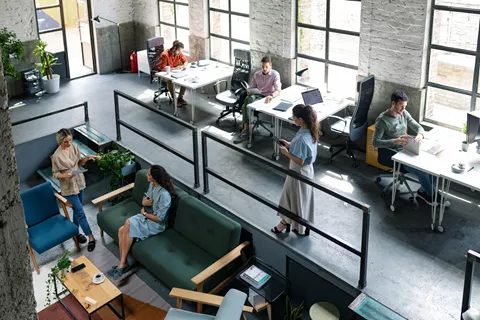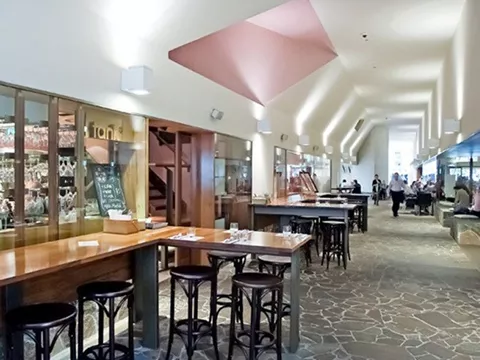
What is Hot Desking?
Hot-desking is a workstation system in the office in which desks are utilised by different people at different times throughout the day, on an ad hoc basis. In today's business world, hot desking has become a normality, allowing people to move around desks within a day, making it useful for both self-employed people and large business corporates to keep productive and connected while on the move. Servcorp offers a range of hot desking services within Coworking spaces.
Typically, the goal is to make the most efficient use of space, therefore eliminating the waste of under-utilised office space. Hot desks may be used in both private offices and coworking environments. The freedom to work wherever and at a different desk space often increases employee creativity, motivation and productivity, as well as promoting the social aspect and therefore cross cooperation.
How does Hot Desking work?
The Hot Desking system is as simple as finding an available desk within the shared environment, plugging it in, getting technology set up and commencing work tasks. Hot desking provides workers with flexibility to work in either fully serviced or Coworking office environments. Therefore, this means the logistics of hot desking will vary depending on the space, with some key factors to consider below.
Access to power outlets and phones
Hot desks typically come with their own power outlets and WiFi connection. In shared coworking spaces like Servcorp, there are specific spaces dedicated for phone conversations including phone booths and communal lounges. If you want a permanent desk phone, this will be available in Servcorp's fully serviced offices.
Shared Meeting Rooms
Most hot-desking arrangements within shared coworking spaces allow you to book meeting rooms through an app or a web login.
Printing Services
Hot desking frequently includes a centralised printer that users may access with an app or through a web log-in, similar to meeting rooms. In shared workspaces, these printers are maintained by community workers, who also oversee them. Office managers in private offices manage them internally. Servcorp's hot desk offices provide full access to printing, copying and scanning from any desk.
Storing personal items
The issue of no dedicated place to store personal belongings, such as jackets and job accessories has long been a common complaint among hot-desking users. This is managed differently across various offices; in some coworking spaces, usually users are allowed to leave their belongings at a hot desk for a set period of time while they go to meetings or take lunch breaks.
In some instances, cubby holes or lockers are provided for the company's hot-desk users. Claiming the same desk for the whole day, regardless of meetings or lunch breaks, is more common in fully serviced offices.
Internet and Technology Services
It would be very difficult to hot desk without laptops, tablets and smartphones, therefore all hot desking arrangements should provide WiFi to accommodate all workers.
Some people, on the other hand, need more than their laptop to perform all aspects of their job efficiently. As a result, some hot desks include a monitor and a VGA, DVI, or HDMI connection so that users may connect an additional screen temporarily.
Servcorp's hot desk office solutions provide full access to coworking during business hours, free wifi, printing, copying and scanning from any desk, a full secretarial team and local IT help.
Common areas such as kitchens and Bathrooms
Hot desking accommodations, like those found in most office settings, include facilities such as restrooms and kitchens, which are cleaned and maintained by office management.
Included within Servcorp's hot desking service is unlimited self-serve coffee, Twinings Tea and fruit water.
Private Spaces
Many professions, particularly those that require you to meet with other people or conduct strategic planning or financial discussions, demand some private meetings during the day. Therefore private spaces will be provided throughout hot desking office setups.
Hot Desking Advantages
The advantages of hot-desking vary depending on the type of work and job requirements. Business owners value the varied lease terms and the option to hire or contract workers to locations in other cities. Freelancers also appreciate having a place to work and meet potential clients.
A. Flexibility in Lease Terms:
Many businesses flock to hot desking environments because of their flexible lease terms, which present a low-risk commitment. Typically, acquiring traditional office space demands a lease spanning 5 or more years, and this isn’t feasible for all businesses.
On the other hand, hot desks require a commitment as low as one month. This mitigates the risk and costs associated with a standard office. For maximum flexibility, we recommend opting for memberships such as coworking on demand, which grants pay-as-you-go access.
Your flexibility doesn’t end there. Since hot desks require minimal setup and are flexible, it also ensures they can easily adapt to your business needs. Whether you’re scaling up or downsizing, the process becomes streamlined and simplified.
B. Option to Hire or Contract Workers in Different Locations:
Geographical limitations often hinder acquiring top-quality talent, but this complication can be tackled via hot desking. For example, a business established at a coworking space at Tower One Barangaroo in Sydney can seamlessly hire a contractor at 101 Collins Street in Melbourne.
Finding a hot desking provider that offers many locations in commercial hubs worldwide significantly increases your talent pool. Businesses can also facilitate remote work and distribute teams across multiple cities, states, and even countries.
C. Convenience for Freelancers to Work and Meet Clients:
Freelancers who work remotely from cafes or homes struggle with burnout syndrome and find an appropriate space for meeting clients. It’s difficult line to balance between working from a professional space without sacrificing the flexibility freelancers have.
Hot desks offer a flexible and professional workspace beyond a home environment. It ensures clients perceive your business as credible and serves as a significant trust factor. Freelancers also rely on word-of-mouth to gain new clients and visibility, which makes the coworking environment ideal.
These shared spaces commonly host networking events and workshops, presenting many opportunities for creating valuable connections.
Hot Desking Disadvantages
Other disadvantages may include employees not having the freedom to personalise their desk, the disruption of moving around desks and re-setting up, as well as the difficulty of communicating with colleagues or members of the team if they aren't close by.
A. Limited Personalisation of Desks for Employees:
Unlike a standard office space where you can select the colour of your chair, walls, logos, and branding, these options aren’t generally available with hot desks. Shared spaces come fully furnished and there isn’t much room for personalisation.
This can be a drawback for individuals who prefer familiarity. It may impact your morale and possibly feel exhausting due to constantly needing to adjust to another desk. People who like personalisation should opt for a dedicated desk. They are still part of the shared office environment but become your permanent desk.
B. Disruption and Setup Time when Moving Around Desks:
Hot desks can be an inconvenience if you require a significant amount of office gear. For example, someone whose desk setup is commonly covered in files, pens, and other accessories will find it difficult to relocate every day.
Albeit a 15-minute setup at most, this can convert to a loss of productivity over time. We recommend keeping your setups efficient for hot desking and organisation a strategy for a leaner operation.
C. Challenges in Communication with Distant Colleagues or Team Members:
While having remote workers and distributed teams is a great benefit of hot desking, it becomes challenging in terms of communication. Talking explicitly via emails, messaging tools, and video calls can become draining, and potentially inefficient.
Dependency on communication tools requires crystal-clear messaging to avoid misunderstandings or confusion. Businesses that hot desk from multiple locations should establish clear communication protocols and highlight the purpose of each tool, and their usage.
What types of individuals or businesses typically utilise hot desking?
Hot Desking for Freelancers
Freelancers make up about 42% of coworking space members across the globe. Hot desks are undeniably a favourite amongst these types of workers, due to the flexible and collaborative nature that aligns with freelancers.
Combine these factors with low-cost access to professional workspaces and ample networking opportunities—you have a winning formula for freelancers. Hot desks are designed in an open floor plan style, making them perfect for freelancers in creative industries who commonly require collaboration and over-the-shoulder interactions.
Overall, the benefits and environment of a hot desk are very well tailored toward the freelancing workforce.
Hot Desking for the Self-Employed
If you're a consultant, freelancer, or company owner who works from the same location, hot-desking is an adaptable and inexpensive alternative to renting office space - without the hassle and financial commitment of long-term office lease agreements.
Working from home may feel isolated, therefore working in a group setting and hot desking around like-minded individuals can help you feel less lonely and more productive and motivated. Your company is more accessible than ever before and nowadays you can work from anywhere and stay connected.
Hot-desking for Expanding Companies
When it comes to expanding your team and scaling your company, agility is essential and hot-desking allows you to hire remote employees without making a large upfront investment. Individual contracts are a great way to get started in specific markets and scale up when necessary, as well as reduce the risks involved with establishing your own office.
Working from home has several advantages: it allows companies to acquire top talent, which is not limited by location. You may expand your team wherever great people live and work without having to build your own workspace or incur moving costs. The cost savings that come with flexible rent agreements and the outsourcing of office employees, cleaning services and facilities are major incentives for large corporations.
Hot Desking for Hybrid Workers
Hot desking for hybrid workers caters to individuals who split their time between remote and office-based work. This setup provides flexibility by offering access to shared workspaces on days when employees choose to work from the office.
It enables hybrid workers to maintain a professional work environment, collaborate with colleagues and optimise their productivity while balancing remote and in-person work arrangements.
This setup is incredibly cost-efficient because it tackles the issue of office space vacancy. Companies that have hybrid working in traditional offices commonly deal with underutilised office space, which is an explicit cost. Whereas with hot desks, simply plan a roster to rotate workers within the coworking space, and seamlessly upscale or downsize the number of desks you need.
Hot Desking for Distributed Teams
Hot desking facilitates collaboration and flexibility for distributed teams spread across different locations. It provides shared workspaces where team members can come together for meetings, brainstorming sessions, and collaborative work, fostering a sense of unity despite physical distance.
How Hot Desking Promotes Collaboration and Innovation Among Workers
Whether it's in a private office or a larger coworking space, hot-desking allows individuals from different teams and organisations to collaborate, creating a unique network of professionals. This connection often leads to fresh opportunities, in which new clients, investors, partners, or employees are gained through hot-desking interactions.
How to know if Hot Desking isn't the right Solution for your Business
While there are multiple benefits of hot desking, it mightn't be the right solution for all businesses or work styles. Companies who handle highly sensitive information may want a more private layout, as well as teams that require consistent structure and continuous collaboration throughout the day might become irritated and distracted with the seating rotation. If you require more private environments that you have more control over, you should consider Servcorp's fully serviced offices.
To conclude, hot desking within a coworking space, allows great flexibility while a business is establishing itself or growing. As businesses have to make big business decisions such as expanding into new markets or sourcing remote talent, hot desking and Coworking environments release financial pressure of lock-in costs and leasing of traditional office floors and buildings.
Looking to establish a new business & set up Hot Desking?
Servcorp provides a one-stop-shop solution with tailored service packages for businesses looking to establish themselves within new global markets.
Servcorp provides many hot desking solutions allows you to position your business with a quality image when you incorporate with one of our five 5-star CBD addresses including mail and courier management.
Frequently Asked Questions






